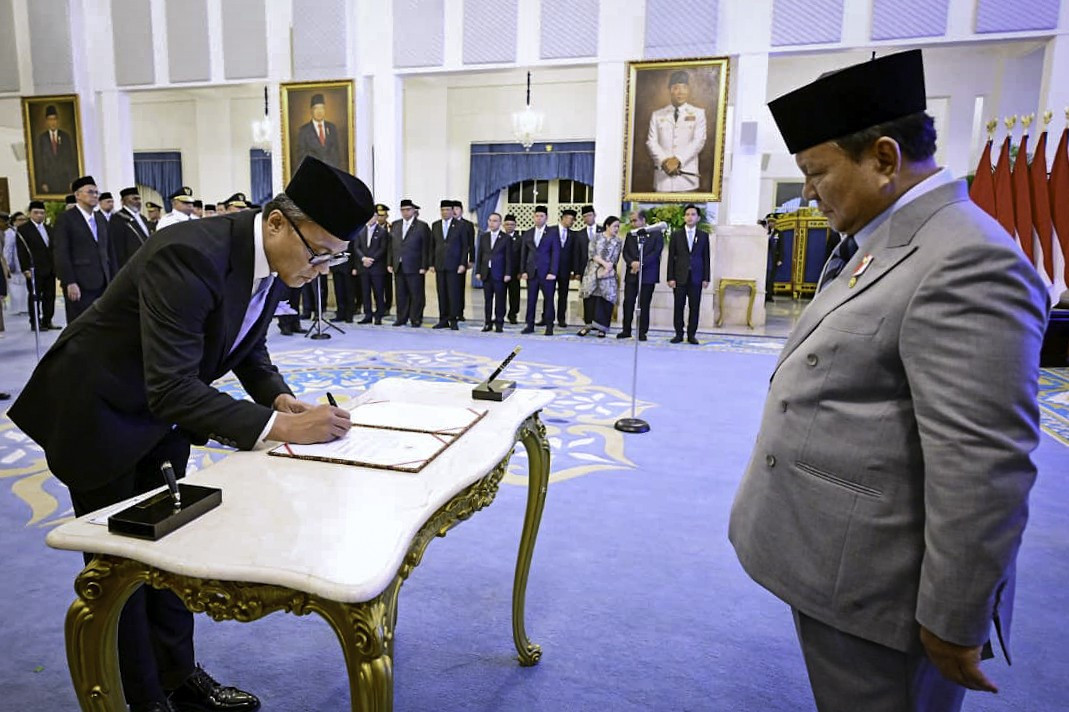News
Prabowo’s expanding power structure testing govt efficiency
Tenggara Strategics October 13, 2025 Dony Oskaria (left) signs an official decree as President Prabowo Subianto inaugurates the head and deputy heads of the State-Owned Enterprises (SOEs) Regulatory Agency (BP BUMN) at the State Palace in Jakarta on Oct. 8, 2025. (BPMI Setpres/Laily Rachev) (BPMI Setpres/Laily Rachev)
Dony Oskaria (left) signs an official decree as President Prabowo Subianto inaugurates the head and deputy heads of the State-Owned Enterprises (SOEs) Regulatory Agency (BP BUMN) at the State Palace in Jakarta on Oct. 8, 2025. (BPMI Setpres/Laily Rachev) (BPMI Setpres/Laily Rachev)
President Prabowo Subianto has recently implemented another round of changes to his cabinet, significantly expanding the executive branch by bringing in numerous figures, many of whom are affiliated with his Gerindra Party. This political maneuver has resulted in an increasingly swelling government structure, raising serious concerns about the potential for overlapping authority and administrative ineffectiveness.
The President inaugurated a total of 25 state officials, including the head and deputy heads of the State-Owned Enterprises Regulatory Agency, two new deputy ministers, members of the executive committee for the Acceleration of Special Autonomy Development in Papua, the board of commissioners of the Deposit Insurance Corporation and several presidential special assistants.
Among the new appointments is Benjamin Paulus Octavianus as Deputy Health Minister. A pulmonologist and Gerindra politician, Benjamin previously served as special assistant to the defense minister for health affairs during Prabowo’s tenure at the Defense Ministry. Additionally, President Prabowo inaugurated Akhmad Wiyagus, formerly the chief operational assistant to the National Police Chief, as the third Deputy Home Minister, joining Bima Arya and Ribka Haluk in that position.
Home Minister Tito Karnavian plans to delegate responsibilities to the three deputy ministers based on Indonesia’s regional time zones: the Western Region (Sumatra and Java), the Central Region (Kalimantan and Sulawesi) and the Eastern Region (Bali, Maluku and Papua). Tito has instructed each deputy to make direct visits to their respective regions to address local issues and monitor inflation, a persistent challenge for local administrations due to their limited capacity for effective management.
In the context of Papua, President Prabowo inaugurated nine members of the executive committee for the Acceleration of Special Autonomy Development. These members include Yanni, chair of the Gerindra Party’s Papua Regional Leadership Council, and Juharson Estrella Sihasale, an artist and former Gerindra legislative candidate from Papua.
The establishment of this committee has generated concerns that its authority will overlap with existing government bodies, potentially complicating the bureaucracy rather than enhancing effectiveness and rendering the body largely symbolic.
Furthermore, President Prabowo installed Matius Fakhiri and Aryoko Rumaropen as Governor and Deputy Governor of Papua, following their victory in the gubernatorial election rerun over the Democratic Party of Struggle (PDI-P)-backed opponents. Matius, supported by 17 political parties, previously served as the Papua police chief before entering politics and joining the Gerindra Party in 2024.
Beyond the executive branch, alongside several high-ranking government officials, President Prabowo also appointed 10 new ambassadors, including Irene as Deputy Ambassador to China. Foreign Minister Sugiono explained that Irene’s appointment is part of Indonesia’s plan to open another Consulate General in the country, an effort seen as strengthening bilateral relations with China.
However, Irene’s lack of a diplomatic background has raised questions, as she is a medical doctor and a Gerindra Party politician who ran as a legislative candidate in the 2019 elections. She is also known as a socialite and previously served as a campaign spokesperson for the Prabowo–Gibran Rakabuming presidential ticket.
Finally, two of the newly inaugurated presidential special assistants are affiliated with Taruna Nusantara, a semi-military high school in Magelang known as the alma mater of several current cabinet members, including Coordinating Minister Agus Harimurti Yudhoyono and Foreign Minister Sugiono.
Overall, the recent appointments highlight a clear strategy of power consolidation through the introduction of political loyalists and the creation of new, often duplicative, government bodies. This significant expansion, driven heavily by Gerindra affiliation, sets up a crucial test of whether the government can maintain coherence and effectiveness despite increasing bureaucratic bloat.
What we've heard
President Prabowo's recent appointments, including several new presidential special assistants and the head of the Deposit Insurance Corporation (LPS), are widely seen as part of a strategy to reward longstanding loyalists and consolidate power with trusted allies.

